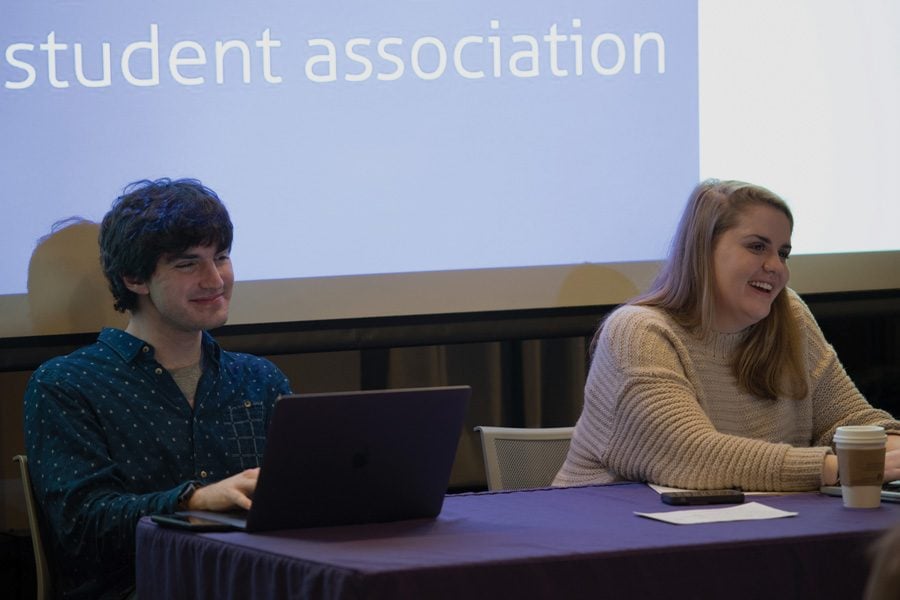RTVF students voice concerns about funding system in town hall meeting
Linnea Narducci/The Daily Northwestern
Communication seniors Isaac Sims (left) and Erin Manning host the RTVF town hall meeting. RTVF students criticized the policies of the new grant-giving system and asked for more transparency and accountability from the department.
January 19, 2017
Although the Department of Radio, Television and Film has said its new project funding system is an “improvement,” RTVF students voiced a slew of concerns at a departmental town hall meeting Wednesday.
About 20 students attended the gathering, which was hosted by the Undergraduate RTVF Student Association. Attendees discussed how the Media Arts Grants — which were established during the last academic year — have impacted student filmmaking on campus and proposed solutions to present to administrators.
Communication senior Sophie Gordon said the new system creates a disconnect between advisers and grant recipients, as students are not able to receive the resources they would have from student groups. Students are “here to learn,” and first-time writers and directors may find it difficult to produce projects without the appropriate attention from experienced filmmakers, Gordon said.
“The MAG system offers less than zero support other than monetary,” she said. “You are given a very small of money, and you ask yourself, ‘OK, what do I do with this now?’ I’m supposed to make a movie but I have no resources.”
No administrators attended the event. Department chair and RTVF Prof. Dave Tolchinsky said in an email to The Daily that he believes the department is in “awesome shape” and that a lot of students were unhappy with the old system but are content with MAGs.
The grant system has already drawn criticism from students for stripping student groups of their independence to greenlight their own projects, with Communication alumni mobilizing to spark discussion around the issue.
“One thing we can do better is get information out about what MAG is and isn’t, what’s changed and what hasn’t changed,” Tolchinsky said in the email.
Currently, the MAG page on the School of Communication’s website says the adjustments to the funding system were made for the department to build a “more inclusive, transparent, and efficient” award process, through which projects are selected solely based on artistic merit.
But students at the town hall meeting criticized the system’s lack of transparency and accountability.
Communication senior Erin Manning said RTVF students are not told who awards the MAGs. She added that students do not know if the diversity of recipients is taken into consideration during the project selection process.
Grant recipients also have the ability to change their projects entirely after their original pitches, a problem Manning said is caused because MAG applications do not require scripts to be attached.
“Such a lack of follow up and accountability creates a problem in terms of representation,” said Manning, who co-chairs URSA and student filmmaking group Studio 22. “In a way, it’s easier to work the system within this system.”
Tolchinsky did not reply to further requests for comment by the time of publication.
URSA also collected written feedback from students at the meeting, asking them to share suggestions for improving the system. But some students felt that mobilization efforts eventually “fall on deaf ears,” Communication junior Malloy Moseley said.
Although she does not believe the MAG system is an “inherently terrible” process, Manning said URSA will ask for better communication between the department and the students while transitioning into the new system.
“Students are adapting to it because they have to,” Manning told The Daily.
Email: [email protected]
Twitter: @stavrosagorakis


